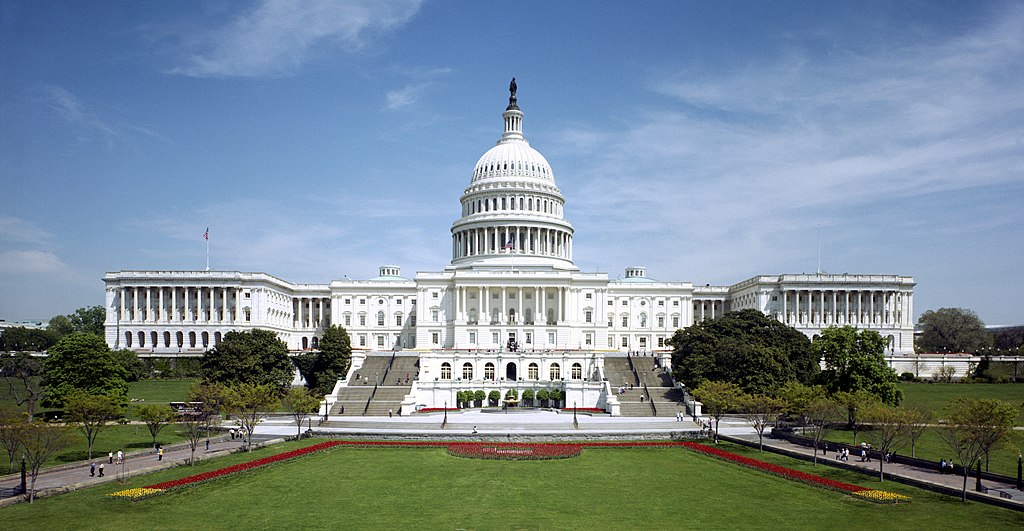Confidence in Government on National Security Matters: May 2019
In July 2017, we began a polling project to measure public confidence in government institutions on national security matters on an ongoing basis. This post provides our data for the month of May 2019—and includes previously unpublished data for the previous two months as well.

Published by The Lawfare Institute
in Cooperation With

In July 2017, we began a polling project to measure public confidence in government institutions on national security matters on an ongoing basis. This post provides our data for the month of May 2019—and includes previously unpublished data for the previous two months as well. It includes public perceptions of government institutions and of the two major political parties’ handling of national security; about the public’s comfort with intelligence authorities; about the president’s handling of key national security issues; about Special Counsel Robert Mueller’s investigation; and about ongoing military operations.
Confidence in Institutions to Protect U.S. National Security Was Mixed in May
From May 25 to May 27, we used Google Surveys to ask respondents the following questions about confidence in institutions:
- How much confidence do you have in the Congress to protect U.S. national security?
- How much confidence do you have in the federal courts to protect U.S. national security?
- How much confidence do you have in the president to protect U.S. national security?
- How much confidence do you have in the intelligence community to protect U.S. national security?
- How much confidence do you have in the military to protect U.S. national security?
Since we last reported, for February, on confidence in these institutions to protect U.S. national security, confidence in the president increased slightly, while confidence in Congress, the courts, and the intelligence community fell and confidence in the military was unchanged. On a scale of 1 (“no confidence”) to 5 (“high confidence”), the average score for each institution, from highest to lowest, was 3.87 for the military, 3.19 for the intelligence community, 2.85 for the president, 2.82 for the federal courts and 2.49 for Congress.
Average confidence in the president on national security increased marginally from 2.80 in our February polling to 2.85 in May—bouncing around a bit over the three months in question. This period coincided with the release of the Mueller report, which appears to have had little impact on confidence in the president one way or another. It also coincided with the president continuing to push a trade war with China and increasing tensions with Iran. Also notable this month is that confidence in Congress has fallen to its lowest point since January, during the government shutdown.

Republicans Maintain Their Advantage on National Security, but the Gap Between the Parties Shrinks
In May, average confidence in the Republican Party was 2.79 on our scale, the same approximate level it has been at since February. Average confidence in the Democratic Party was 2.60 in May, a slight reduction since April. While confidence in the Democratic Party remains slightly above that of Congress (2.49), Democrats continue to lag noticeably behind Republicans in the eyes of the American public when it comes to protecting the country. This is consistent with past polling conducted by Third Way and others that identified this trust gap in national security.

Republicans’ advantage for our second question on partisanship and national security—“Which of the parties will do a better job protecting the country from international terrorism and military threats?”—shrunk to just seven points this month. On this question, respondents are asked to choose between the parties or options of “neither” or “don’t know.” When asked in this manner, 31 percent of respondents chose the Republican Party, while 24 percent chose the Democratic Party; 24 percent chose “don’t know,” and 21 percent chose “neither.” While Republicans maintain a decisive advantage on this question, this is the smallest gap between the parties that we’ve seen since January, when the Democrats gained control of the House of Representatives.

The Public Remains Uncertain About Intelligence Authorities
In late May we once again asked respondents, “How comfortable are you with the powers of the U.S. intelligence community? Do intelligence agencies in your view have not enough authority or do they have too much authority?” The average response in May was a 3.14 on our scale. This is the highest level we’ve seen for this question since last September. However, this month, as in all previous months, far and away the most common response to this question (44 percent) was a neutral 3 on our scale. And 72 percent of respondents chose one of the middle three options, not either 1 or 5. These numbers have been relatively stable in the period in which we have asked this question, ranging from a low of 3.00 to a high of 3.18 seemingly randomly. During this period, the country has not experienced notable intelligence failures, terrorist attacks or intelligence scandals, despite continued tensions between the judgments of the intelligence agencies and the public pronouncements by administration officials. These disputes, however, seem to receive little public notice. As such, the stability of these numbers during such a period offers a good baseline against which to measure any changes if and when the political process suddenly lurches to consider either expanding or contracting intelligence authorities.
Confidence in the President’s Handling of Key National Security Issues Remains Low but Stable
In November 2017, we began asking respondents how confident they were in the president’s ability to handle key national security issues, specifically with regard to Iran, North Korea and terrorism. In May, confidence in the president on these topics was 2.60 for Iran, 2.55 for North Korea and 2.73 for terrorism. These figures have changed little in recent months, with the public continuing to hold little confidence in the president on these issues. This seeming imperviousness to change is perhaps noteworthy given that both North Korea and Iran have been in the news as examples of a difference of opinion between the president and his advisers. Also notable is that—as we’ve seen previously—respondents have greater general confidence in the president on national security, at 2.85, than on any of these individual issues.

Confidence in Special Counsel Mueller Remains High Following Report Release
As we have since October 2017, we once again asked the public about its level of confidence in Special Counsel Robert Mueller’s “fairness and objectivity” at the end of May. Consistent with findings since March, after Attorney General William Barr released his summary of the Mueller report, confidence in Mueller remains extremely high, at 3.15 on our scale. This month’s survey concluded two days before Mueller’s press conference on May 29. As we have conjectured previously, this increase in confidence is likely attributable to gains with Republicans who interpreted the Mueller report as an exoneration of the president. We conducted a parallel set of surveys before and after the delivery of the Mueller report that captured Republicans’ upswing in confidence in Mueller after Barr’s summary was released on March 24. Our most recent update of these parallel surveys, in early May, again found that confidence in Mueller is extremely high among Republicans.
As Mueller has now resigned, we will not revisit the question of confidence in him unless he is called as a witness or Congress holds a hearing where his investigation is the topic of inquiry.
Confidence in Ongoing Military Operations Remains Low but Stable
While the military enjoys the highest level of public confidence of any government institution we ask about (a 3.87 on our scale), confidence in ongoing military operations in Afghanistan and Iraq and Syria is markedly lower, with average confidence scores of 2.87 and 2.76, respectively. While this is an uptick in confidence in the Afghan war, both of these numbers are well within the range of what we’ve observed throughout this polling project.
Our consistent findings of middling public confidence in these conflicts corresponds with a recent poll from the Charles Koch Institute and Real Clear Politics, as well as a recent Eurasia Group Foundation poll, which found that Americans generally prefer to avoid military interventions.

Methodology
From May 25 to May 27, we once again used Google Surveys, which is supporting this project with a large in-kind donation of access to its survey platform, to ask a variety of questions related to national security. Respondents are internet users age 18 and older who answer “surveywall” questions on websites that use Google Opinion Rewards for Publishers to access content. Surveys appear on a network of more than 1,500 sites, including USA Today and the Financial Times. For more information on Google Surveys’ methodology, including questions regarding sampling bias and inferred demographics, please see Google’s white paper on the topic. A follow-up paper from Katrina Sostek showed Google Surveys’ accuracy versus benchmark questions to be comparable to other online survey platforms, with some differences noted based on weighting schemes. Benjamin Wittes and Emma Kohse also discussed criticisms and advantages of the Google Surveys methodology at some length in this paper.








